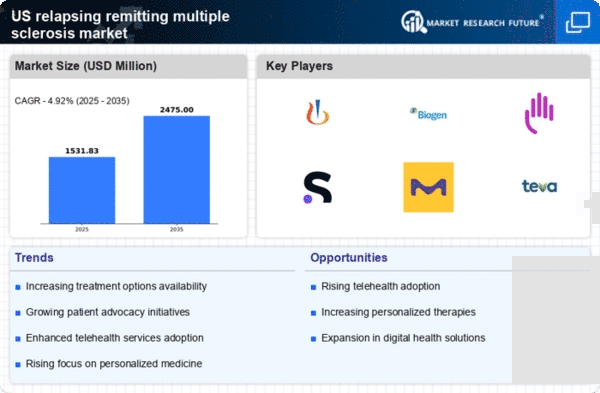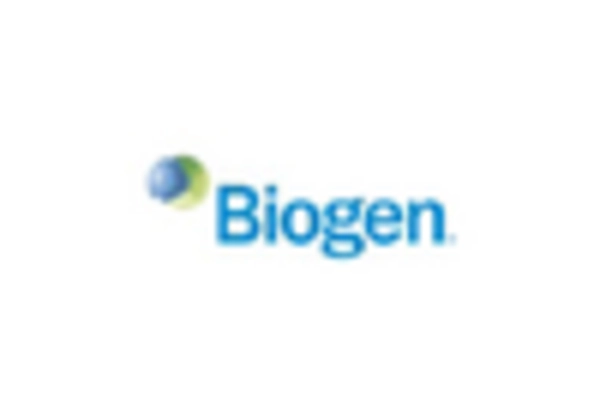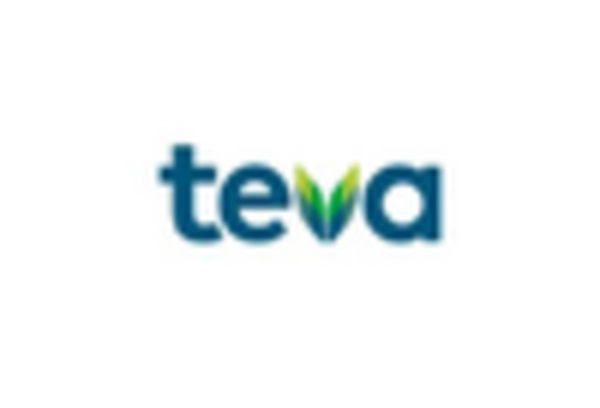Rising Awareness and Education
The increasing awareness and education surrounding multiple sclerosis are crucial drivers for the relapsing remitting-multiple-sclerosis market. Advocacy groups and healthcare organizations are actively working to educate the public and healthcare professionals about MS, its symptoms, and available treatment options. This heightened awareness is leading to earlier diagnoses and increased patient engagement in treatment decisions. In 2025, it is estimated that awareness campaigns will reach millions, significantly impacting the number of individuals seeking treatment. As more patients become informed about their condition, the demand for therapies in the relapsing remitting-multiple-sclerosis market is expected to rise, prompting healthcare providers to expand their offerings.
Government Initiatives and Funding
Government initiatives and funding play a pivotal role in shaping the relapsing remitting-multiple-sclerosis market. In recent years, federal and state governments have increased their support for MS research, allocating millions of dollars to various programs aimed at understanding and treating the disease. For instance, the National Institutes of Health (NIH) has dedicated substantial resources to MS research, which has led to breakthroughs in treatment methodologies. This financial backing not only fosters innovation but also encourages collaboration between public and private sectors, enhancing the overall landscape of the relapsing remitting-multiple-sclerosis market. As funding continues to grow, it is likely that new therapies will emerge, further driving market expansion.
Advancements in Research and Development
Ongoing advancements in research and development (R&D) are significantly influencing the relapsing remitting-multiple-sclerosis market. Pharmaceutical companies are investing heavily in R&D to discover new therapies and improve existing ones. In 2025, the market is projected to witness a substantial increase in the number of clinical trials focused on relapsing remitting MS, with over 200 trials currently underway in the US. These efforts are aimed at enhancing treatment efficacy and minimizing side effects, which could lead to better patient outcomes. The influx of novel therapies resulting from these R&D initiatives is expected to create a competitive landscape, driving growth in the relapsing remitting-multiple-sclerosis market as patients gain access to more effective treatment options.
Increasing Prevalence of Multiple Sclerosis
The rising incidence of multiple sclerosis (MS) in the US is a critical driver for the relapsing remitting-multiple-sclerosis market. Recent estimates indicate that approximately 1 million individuals are living with MS in the US, with relapsing remitting MS being the most common form. This growing patient population necessitates the development and availability of effective treatment options, thereby stimulating market growth. As awareness of MS increases, more individuals are being diagnosed, which further propels demand for therapies. The relapsing remitting-multiple-sclerosis market is likely to expand as healthcare providers seek to address the needs of this increasing demographic, leading to a surge in research and development activities aimed at innovative treatment solutions.
Technological Innovations in Treatment Delivery
Technological innovations in treatment delivery are transforming the relapsing remitting-multiple-sclerosis market. The advent of new drug delivery systems, such as autoinjectors and oral medications, is enhancing patient compliance and convenience. In 2025, it is anticipated that the market will see a surge in the adoption of these technologies, which could lead to improved treatment adherence among patients. Furthermore, advancements in telemedicine and remote monitoring are enabling healthcare providers to offer more personalized care, allowing for timely adjustments to treatment plans. These innovations not only improve patient outcomes but also contribute to the overall growth of the relapsing remitting-multiple-sclerosis market as they facilitate easier access to therapies.

















